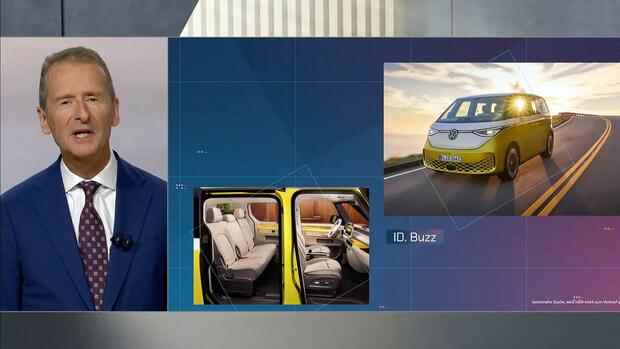Volkswagen CEO Herbert Diess warned at the virtual AGM that the global economy would break up into several blocks.
(Photo: IMAGO/sepp spiegl)
Dusseldorf The VW Group does not expect any new problems with the supply of parts because of the Ukraine war. “We assume that the supply situation will normalize even if the war lasts longer,” said CEO Herbert Diess on Thursday at the virtual general meeting of the Wolfsburg car manufacturer. Volkswagen also benefits from its “good order situation”.
Immediately after the outbreak of war at the end of February, various suppliers had to stop their production of cable harnesses in the Ukraine. As a result, production at German car manufacturers, above all at Volkswagen, came to a standstill. An estimated 100,000 vehicles could therefore not be produced.
In the meantime, most suppliers have been able to resume work in Ukraine. In addition, the car manufacturers, together with their suppliers, have set up replacement production in other European countries in order to be prepared for possible new emergencies.
“We were able to compensate for the supply bottlenecks in the short term,” said CEO Diess, summarizing the development. That’s why Volkswagen has stuck to its return outlook for the current year.
Top jobs of the day
Find the best jobs now and
be notified by email.
In 2022, the Wolfsburg car manufacturer calculates an operating margin of between seven and 8.5 percent. This also means that the VW shareholders do not have to adjust to any new cuts. The group is sticking to its original dividend proposal: 7.50 euros for the common share, 7.56 euros for the non-voting preferred share. This corresponds to an increase of more than 50 percent compared to the previous year.
VW boss Diess on the global economy: Do not allow new bloc formation
At the same time, CEO Diess called for adherence to the model of globalization and the principle of “change through trade”. Forming a new bloc cannot be the answer to the Ukraine war and the conflict with Russia. “The interdependence of the economic areas ensures that we talk to each other. We can only solve global challenges such as the climate catastrophe together,” emphasized the VW boss.
As a strong export nation, Germany in particular has benefited immensely from globalization. It leads to prosperity and technological progress. The Federal Republic is dependent on open markets and free trade. “Our economic strength has given us an important voice in the world over the past decades,” he added.
Volkswagen wants to significantly expand its e-car sales in China, for example with the ID.4 model.
(Photo: imago images/VCG)
Volkswagen therefore wants to stick to globalization itself, especially in China, the Wolfsburg car manufacturer’s most important sales market. The People’s Republic remains the “car market of the future”. With the expansion of the production of electric models, the VW Group wants to defend its position as the market leader in China.
Volkswagen has identified the USA as another important sales market. By 2030, the Wolfsburg-based company wants to expand its market share from around four to ten percent. To this end, the Group will invest more than seven billion euros over the next five years. “Electrification also offers the opportunity to enter the pickup market in the USA,” emphasized Diess. On Wednesday, Volkswagen announced that a new line of pickup trucks and SUVs would be produced in the United States starting in 2026.
>> Read about this: What Volkswagen is planning with the new “Scout” brand in the USA
Strategically, Diess sees the VW Group correctly positioned. “The course we have set is showing success,” said the CEO. Volkswagen is on the right track when it comes to electrification and digitization. The group sold around 450,000 purely electrically powered cars worldwide last year. This number is set to double in 2022. Volkswagen is also making good progress in building up its own strong software expertise.
VW wants to be as profitable in the sale of electric cars as it is in the combustion engine business. “We assume that the e-mobility business will be as profitable as our combustion engine business sooner than planned,” announced Diess. The group can roll out its modular system to more and more models. VW had previously announced that in two to three years it would earn as much with electric cars as with conventional combustion engines.
Criticism of the dissolution of the diesel committee
The VW supervisory board chairman Hans Dieter Pötsch said at the annual general meeting that the group had dissolved the special investigation committee “Diesel” formed in autumn 2015. As a reason, Pötsch stated that the civil investigations in connection with the affair had been completed.
Criticism of this decision came from among the shareholders. Christian Strenger, longtime boss of the asset manager DWS, which belongs to Deutsche Bank, spoke of a “misjudgment”. The diesel investigations at Volkswagen could not be stopped for a long time.
Elsewhere, too, the diesel affair is not over for VW. Last year, the group made a comparison with former CEO Martin Winterkorn, ex-Audi boss Rupert Stadler and other former board members. They pay damages for the diesel scandal in the amount of almost 290 million euros. The majority of this, around 270 million euros, is covered by managerial liability insurance.
According to the head of the supervisory board, Pötsch, two shareholder lawsuits are still pending against this settlement. However, Volkswagen is sticking to its legal position. “The comparison is still effective,” said Pötsch. The former Volkswagen board members have already paid in the meantime.
More: Former trump card, today ballast: China is becoming a balance sheet risk for VW.
